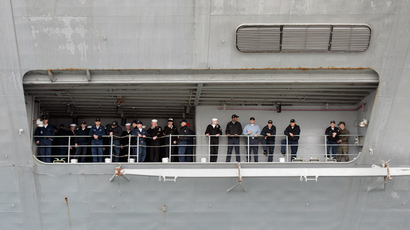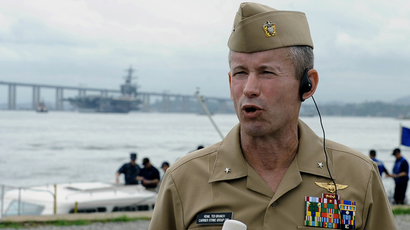Judge sides with US servicemen used as guinea pigs in terrifying Cold War experiment

A federal judge has ruled the United States Army must quickly inform veterans of any potentially harmful health effects stemming from the secret medical and drug experiments conducted on them during the Cold War.
According to a report by Courthouse News wire service, the ruling comes in favor of 7,800 soldiers claiming to have been involved in the experiments. After recruiting Nazi scientists to help through a program called “Project Paperclip,” the Army and CIA administered between 250 and 400 kinds of drugs to the soldiers in an attempt to advance US ability to wage war.
Among the many drugs used were Sarin, amphetamines, LSD, mustard gas, THC, incapacitating agents, and phosgene, a chemical weapon used in trenches during World War I. By administering these drugs and others, the military hoped to uncover new ways to control human behavior, pinpoint weaknesses, hypnotize, and increase an individual’s resistance to torture.
These experiments began in the 1950s and continued until President Richard Nixon halted research into offensive chemical weapons in 1969. Although soldiers signed consent forms agreeing to undertake the experiments, the soldiers argued in court they essentially had no other choice under training that directed them to follow orders. Veterans also argued these forms violated international law and the Wilson Directive, which mandates voluntary consent as “essential.”
After U.S. District Judge Claudia Wilken ruled the Army must notify veterans of possible health concerns related to the experiments in November, the Army requested a delay in the process, claiming the notification process would cost nearly $9 million. This request was denied after Wilken ruled the cost borne by the Army paled in comparison to the health of veterans.
"On the one hand, there are the expenses that will be incurred by defendants and, on the other, there is the very real possibility that the aging and adversely affected test subjects will not learn about health effects that could be mitigated if known," Wilken wrote, according to Courthouse News.
"Any expense incurred by defendants doing research and providing information to adversely affected test subjects, even if defendants should not have been required to incur those expenses, would not be wasted.
"However, lost time for the adversely affected test subjects could lead to irreversible health consequences."
The lingering effects of the experiments have become grounds for contention between former soldiers and the Department of Veterans Affairs. Many veterans believe the long-term health issues they’ve developed can be traced directly back to the drugs they took decades ago at the behest of the government. The VA, however, has declined to cover the medical costs for the vast majority of those applying for coverage.
Speaking to CNN back in 2012, former Army Private Tim Josephs said that unless he agreed to the terms outlined in the experimental consent form, he would be thrown in jail.
"Sometimes it was an injection. Other times it was a pill," Josephs said, though he didn’t know what exactly he was taking. "A lot of chemicals were referred to as agent one or agent two."
Nonetheless, once the military began administering the drugs, Josephs was told, "There is nothing here that could ever harm you." Nowadays, he has been diagnosed with Parkinson’s disease and was forced to retire early. The VA granted him 40 percent disability, but others haven’t been so lucky: roughly 84 of 86 health claims related to chemical or biological contact are turned down.
"The whole thing stinks, and if the American people knew about it, they would not tolerate it,” said attorney Gordon Erspamer to CNN. “This kind of behavior toward our veterans would not be allowed to happen.”














